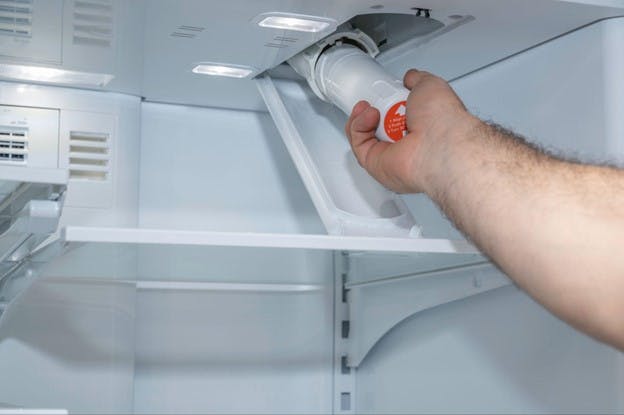🌟 New Arrival! Upgrade Your Water with Our Advanced Pitcher Filter. Shop Now
March 2024
How Well Do Refrigerator Water Filters Purify Your Drinking Water?
The benefits of drinking filtered water aren’t limited to improving the taste and avoiding dehydration. By filtering tap water at home, you can remove common contaminants like chlorine and chromium, and reduce the presence of bacteria and microorganisms. But not all water filters are equally effective at filtering out contaminants.
If you have a refrigerator water filter, you’re probably wondering how effective it is, how often it needs to be replaced, and what else you can do to ensure a safe drinking water supply. Here’s everything you need to know about refrigerator water filters.
How Do Refrigerator Water Filters Work?
Refrigerator water filters work by filtering tap water between your water supply and the built-in water dispenser or ice maker. Refrigerator water filters are usually found inside the refrigerator itself or are attached to the water line outside the fridge.
Many refrigerator water filters use activated carbon to filter out physical impurities in the water supply, but there may be other components to the filter as well.
Since refrigerator water filters are built directly into the appliance, you may not have a lot of choice in which type of filter comes with your refrigerator. You’ll need to replace it on a regular basis to maintain its effectiveness, so you can choose to replace it with a filter from the original equipment manufacturer or a third-party model.
What Contaminants Do Refrigerator Water Filters Remove from Tap Water?
Refrigerator water filters remove common contaminants found in tap water, such as:
- Chlorine, which is added during the water treatment process
- Lead, which can get into the drinking water supply from old lead pipes
- Nitrates and nitrites, which are associated with agricultural pesticide runoff
- Volatile organic compounds (VOCs), which derive from industrial use
Refrigerator water filters may not eliminate 100% of these contaminants, but they can reduce them to safer levels, depending on the quality of your filter. Fridge water filters may not be effective for removing all chemicals or toxins, including chromium, cadmium, arsenic, and selenium, as well as asbestos, bacteria, and pharmaceuticals.
Are Refrigerator Water Filters Enough to Make Tap Water Safe for Drinking?
Whether or not refrigerator water filters make tap water safe for drinking depends on the quality of the filter and how safe your tap water is to begin with. For example, if you use a well and live in a region where the groundwater has high levels of arsenic, using your built-in refrigerator water filter may not protect you from arsenicosis.
On the other hand, if you live in a region with good tap water quality, where the primary concern is chlorine and other chemical byproducts of the disinfection process, you can expect your built-in water filter to be effective at reducing these contaminants.

What Are NSF Ratings for Water Filters?
Whether or not your refrigerator water filter is effective also depends on the refrigerator model. Look for water filters that have been certified by NSF (National Sanitation Foundation), which provides filters with some of the following ratings:
- NSF/ANSI 42: These filters are effective at removing chlorine from tap water and make for better-tasting water overall
- NSF/ANSI 44: Filters with this rating are water softeners that reduce the amount of minerals like calcium and magnesium, which aren’t dangerous but contribute to the bad taste of hard water
- NSF/ANSI 53: Filters with this rating are designed to reduce contaminants with a health effect as defined by the Environmental Protection Agency (EPA)
- NSF/ANSI 55: These filters use ultraviolet light to kill bacteria, cysts, and viruses to reduce the risk of waterborne illnesses
Many refrigerator models have activated carbon filters with a rating of 42 or 53. If you need to eliminate specific contaminants from your water supply, consider installing a whole home water filter or an under sink filter specifically for drinking water.
You can also install a water filter in the bathroom to remove minerals and sediments from your tap water before showering or brushing your teeth.
Which Brands Have the Best Refrigerator Water Filters?
Most major appliance brands offer refrigerators with water filters, including brands like Samsung, Whirlpool, Frigidaire, KitchenAid, Maytag, Kenmore, and Bosch. Check the model number to find out what type of filtration system it uses, what its NSF rating is, and how often it needs to be replaced.
You can either buy refrigerator water filter replacements directly from the manufacturer or purchase replacements from a third-party provider.
For example, the Waterdrop WD-F32 Water Filter is compatible with refrigerators like the LG LT700P and has an NSF/ANSI 42 (for chlorine) and NSF/ANSI 372 (for lead). This filter needs to be replaced every 6 months or 200 gallons.
EveryDrop replacement filters are compatible with multiple models, including Whirlpool refrigerators, and have a flow rate of around 0.75 gallons per minute (gpm).
Meanwhile, if you have a Samsung refrigerator, you can purchase a replacement like the HAF-CIN model, which is certified to NSF/ANSI 42 and 53 standards, as well as NSF/ANSI 401 for pharmaceuticals and pesticides.
Be sure to choose the right filter to ensure the best fit and most effective filtration. For more flexibility, you can install an inline water filter system, which connects directly to your water supply and can be used with nearly any model.
How Do Activated Carbon Water Filters Work?
Activated carbon water filters work by physically filtering water through a carbon-based material, such as coconut carbon made out of coconut shells. Activated carbon has tiny micropores that trap impurities and other contaminants over its massive surface area.
Carbon filters use either granular activated carbon (loose carbon pieces) or a carbon block made up of a dense piece of solid carbon.
Catalytic carbon filters work slightly differently: They use a chemical reaction to convert chemicals like chlorine and hydrogen sulfide into harmless components. As a result, they eliminate more unpleasant tastes and smells than activated carbon.

How Do Carbon Filters Compare to Other Water Filters?
Carbon water filters aren’t the only type of filter you can use in your refrigerator. One option is a reverse osmosis filter, which filters out everything from giardia to E. coli through a semipermeable membrane with pores as small as 0.0001 microns.
Reverse osmosis filters can also reduce levels of arsenic, fluoride, sodium, calcium, chromium, and other dissolved salts and minerals from your water supply.
Since reverse osmosis filters need a certain amount of water pressure and storage capacity, they can be tricky to use as a refrigerator water filter. Instead, consider a whole home reverse osmosis system that can filter all of your tap water.
Other water filtration methods include UV filtration and distillation.
The best type of filter for you will depend on the quality of the water before you filter it and whether there are any specific contaminants of concern.
While some contaminants are harmful, other chemicals and minerals have beneficial effects. For example, removing fluoride and calcium from your drinking water could affect your teeth. If you don’t want to remove fluoride from your water, choose an activated carbon filter rather than reverse osmosis or distillation.
How Can You Check Your Water Quality?
There are several ways to find out if there are any contaminants in your tap water. The first is to check your local water quality, which will tell you how your water was treated and whether the levels of specific contaminants exceed EPA regulations.
The second is to test your tap water. Even if your local water quality is good, lead and other contaminants can get into the water supply from old pipes along the way. If you have a well, industrial and agricultural runoff can contaminate the groundwater.
Some tests are cheap and easy: You can find out how much chlorine is in your water with an at-home test strip. You can also use a TDS meter to check the levels of total dissolved solids (TDS) in your water using electrical conductivity.
For more serious water quality issues, you can send a sample into a certified lab for more advanced testing.
How Often Should You Replace Your Water Filter?
Your refrigerator water filter will only work effectively if you replace it on a regular basis. Over time, contaminants can accumulate in the filter, reducing the effectiveness of the filter, and potentially leading to a buildup of harmful bacteria.
Always follow the manufacturer’s recommendation on when to replace your water filter, such as every 6 months or every 200 gallons. Some refrigerators have a light that will come on to let you know when it’s time to replace your filter. You may also notice the flow of water slowing down as the filter becomes clogged.
If your filter is broken or clogged, you may be able to use the bypass mode, but keep in mind this water may not be suitable for drinking. You can also bypass the water filter if you’re using an alternate filtration method like a whole home filter.

Are Refrigerator Water Filters Worth It?
Refrigerator water filters can be a safe and effective way to filter your tap water. Since they’re built into many refrigerator models and don’t require additional installation, they can be more convenient than other water filtration methods like under sink filters. Still, water refrigerator filters may not filter out every type of contaminant.
To get the most out of your refrigerator water filter, test your tap water to find out what’s in it, and choose a filter with an NSF rating that meets your needs. Replace your water filter regularly to make sure it doesn’t get clogged or lose its effectiveness.
If your refrigerator doesn’t come with a water filter or you want more control over your water filters, consider the HomeWater EZChange 2-Stage Under Counter Under Sink Water Filter or the UPSTREAM™ 4-Stage Whole Home Water Filter instead.